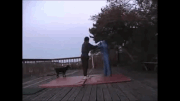My reaction? He's an idiot.
Okay, that was a bit harsh... I'm sure he's an intelligent person, and is certainly eloquent in his speech, however, in this area, he is woefully undereducated, on pretty much every level one can think of. His arguments are full of straw-men, false (and incorrect) assumptions, misunderstanding of concepts and contexts, lack of grasp of key areas, and unverifiable beliefs.
To be fair, though, the entire set-up (in the questioning) is, in itself, deeply lacking in any real understanding of what it is even asking itself, as the interviewer/podcaster seems unsure about what he's actually asking about... so there's a lot that would need to be clarified first.
The first thing that needs to be looked at is the context... self defence and "street fighting" are very different in many areas, so thinking of them as being the same, or somewhat equivalent, is already demonstrating a lack of any real grasp of the topic. Without getting that understood in the first place, you can't really move onto what's "best" suited, as we don't know what we're wanting it to be best for.
The second is to understand the variety of training methodologies... not only what is used, but why, and exactly how it is structured. Of course, you also need to understand that the training methods themselves change over the course of study... so minimalist exposure is really not enough to get a real understanding, excepting in sporting methods (in the main... there are still exceptions to that, of course).
The corollary to this is that you also need to understand the intended context of the system itself, which plays into the cultural background of it's development and foundation; in other words, the "Who", "What", "Where", "When", and "Why" of the system itself. This is going to be the largest difference between a "sport" system, a "traditional" system, and a "classical" system (yeah, I've brought another category into it... but that's really the kind of arts that Nobufusa is asking about in the above OP). And, what cannot be ignored (or, at least, really shouldn't be) is that there are numerous arts that cross borders, being both "sports" and "traditional"... as well as other categorisations that can be applied.
Finally, and this is the big one, it's important to note that no martial arts are actually designed for self defence. None of them. Zero. So, there's that.
There's a lot more to unpack, including the comments from Relnick-sensei about Judo (which is accurate in a modern setting, to be frank), however time is getting away from me, so I'll likely come back to do that either later today, or tomorrow. I'll break down John's interview, and highlight the issues as I see them, but, for now, while I see where he's coming from, he doesn't have the education to speak on this, from my perspective... especially when it comes to talking about other arts approaches, that he misses the reality of entirely.

